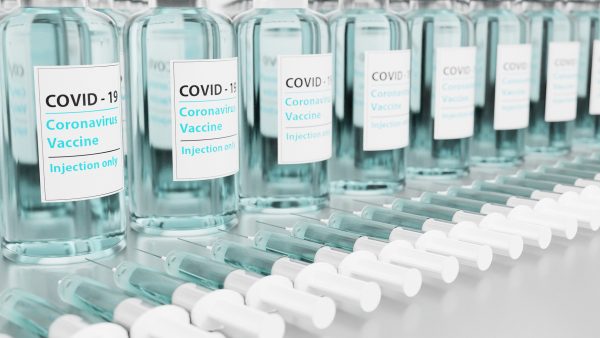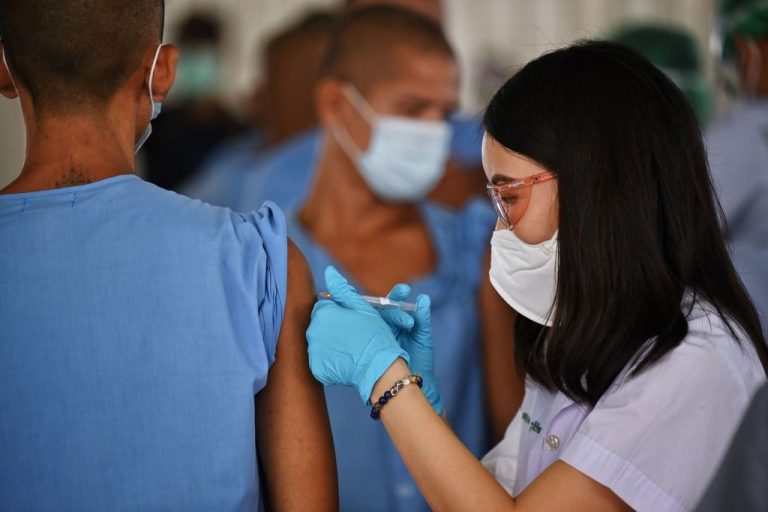Thailand’s Food and Drug Administration (FDA) issued a warning about lumps forming in certain doses of the Chinese-made Sinovac vaccine, also called CoronaVac. The doses were from a batch produced on May 19, with an expiry date of November 9. In total, 110 doses were found to have lumps of gel, rendering them useless.
“Surachok Tangwiwat of the Thai FDA has instructed medical professionals to avoid giving these doses to people and report any abnormalities to the agency immediately. Sinovac must be shaken before use. In the case of these doses, even when shaken, the lumps of gel would not disperse into the liquid,” according to local outlet Coconut.
The problem is believed to be due to improper transportation and storage. The ideal storage temperature for the vaccine is between two and eight degrees Celsius. Thailand’s vaccination campaign, which began in February 2021, has largely been limited to healthcare workers, many injected with CoronaVac. The country has imported more than 10 million doses of the vaccine.

CoronaVac has one of the lowest efficacy rates in the world. A Brazilian study found the vaccine to have an efficacy rate of 50.4 percent among those with mild to severe cases of Coronavirus Disease 2019 (COVID-19), which is just over the World Health Organization’s (WHO) 50 percent threshold for a vaccine to be considered for widespread use.
In an interview with The Guardian, Dr. Pawin Numthavaj, a clinical epidemiologist at Ramathibodi hospital in Thailand, said that reports of COVID-19 outbreaks in nations that have relied on Chinese vaccines were troubling. He called on the Thai government to procure other vaccines.
Success
You are now signed up for our newsletter
Success
Check your email to complete sign up
“The concern for Sinovac is about the published evidence – it is very sparse for Sinovac compared to the other vaccines… This vaccine may be working, but not for everyone… It’s our job to determine who it is working [for] and who it is not,” Pawin said.
In an interview with CNBC in April, Anutin Charnvirakul, the country’s deputy prime minister and public health minister, said that moving forward, the AstraZeneca vaccine would be the primary vaccine in Thailand’s inoculation campaign.
On June 28, AstraZeneca confirmed in a press release that it would hit the June target of delivering six million doses of its COVID-19 vaccine to Thailand’s Ministry of Public Health (MoPH). 4.7 million doses had already been delivered, with the remaining doses to be provided that week. In total, the company plans to deliver 61 million doses to the country.
Many Thai citizens strongly distrust China, and the Prayut government has close ties to China. As such, government efforts to promote Chinese-made Sinovac vaccines have triggered strong reactions. In May, Thai actress Chompoo Araya faced online criticism after sharing her experience receiving a Sinovac dose, which many people perceived as politically motivated.
“You ignore the political turmoil in your country, but you can happily review a vaccine imposed by the government, this is so scripted,” a user on Twitter wrote, according to Thai Inquirer. Another user accused her of being a public relations (PR) agent for the government.
As of July 3, 11.1 percent of the Thai population had received at least one dose of a COVID-19 vaccine, up from 0.2 percent on April 1. During this period, the number of daily new confirmed COVID-19 cases per million rose from 63.71 to 5242.71. In total, Thailand has reported over 280,000 cases and 2,200 deaths since the start of the pandemic.
Sinovac in other countries
China supplies Sinovac’s CoronaVac vaccine and Sinopharm’s BBIBP-CorV vaccine to numerous international customers. However, many countries have started to question the effectiveness of Chinese-made vaccines.
A June 2nd report published by The Wall Street Journal stated that Middle Eastern nations like Bahrain and the United Arab Emirates (UAE) were looking for alternative options after an inoculation campaign using Chinese vaccines failed to produce desirable results.
Waleed Khalifa al Manea, Bahrain’s undersecretary of health, stated that obese or chronically ill residents over 50 years of age were urged to get a Pfizer-BioNTech shot six months after receiving their Sinopharm dose. “Several people I know are finding out they have not developed antibodies after Sinopharm and are rushing to book to get Pfizer,” a resident told the media outlet.
Kenneth Mak, the director of medical services in Singapore, said in a June 16 virtual meeting that the Indonesian outbreak among vaccinated doctors and healthcare workers was proof that CoronaVac presented a significant risk of “vaccine breakthrough.” In Serbia, a study conducted on citizens over 65 who had received the Sinopharm vaccine found that almost 30 percent of them had not developed antibodies.
On June 1st, the Hong Kong Expert Committee announced that they would stop counting post-vaccination deaths unless there was a strong correlation with COVID-19 vaccines. Most of the vaccines administered in Hong Kong are Chinese-made. According to Hong Kong Hospital Authority, 80 vaccinated individuals have died as of May 30, and 23 women have reported miscarriages.


















